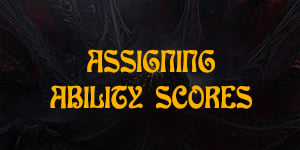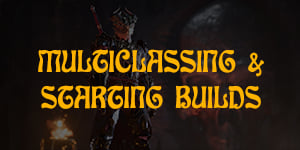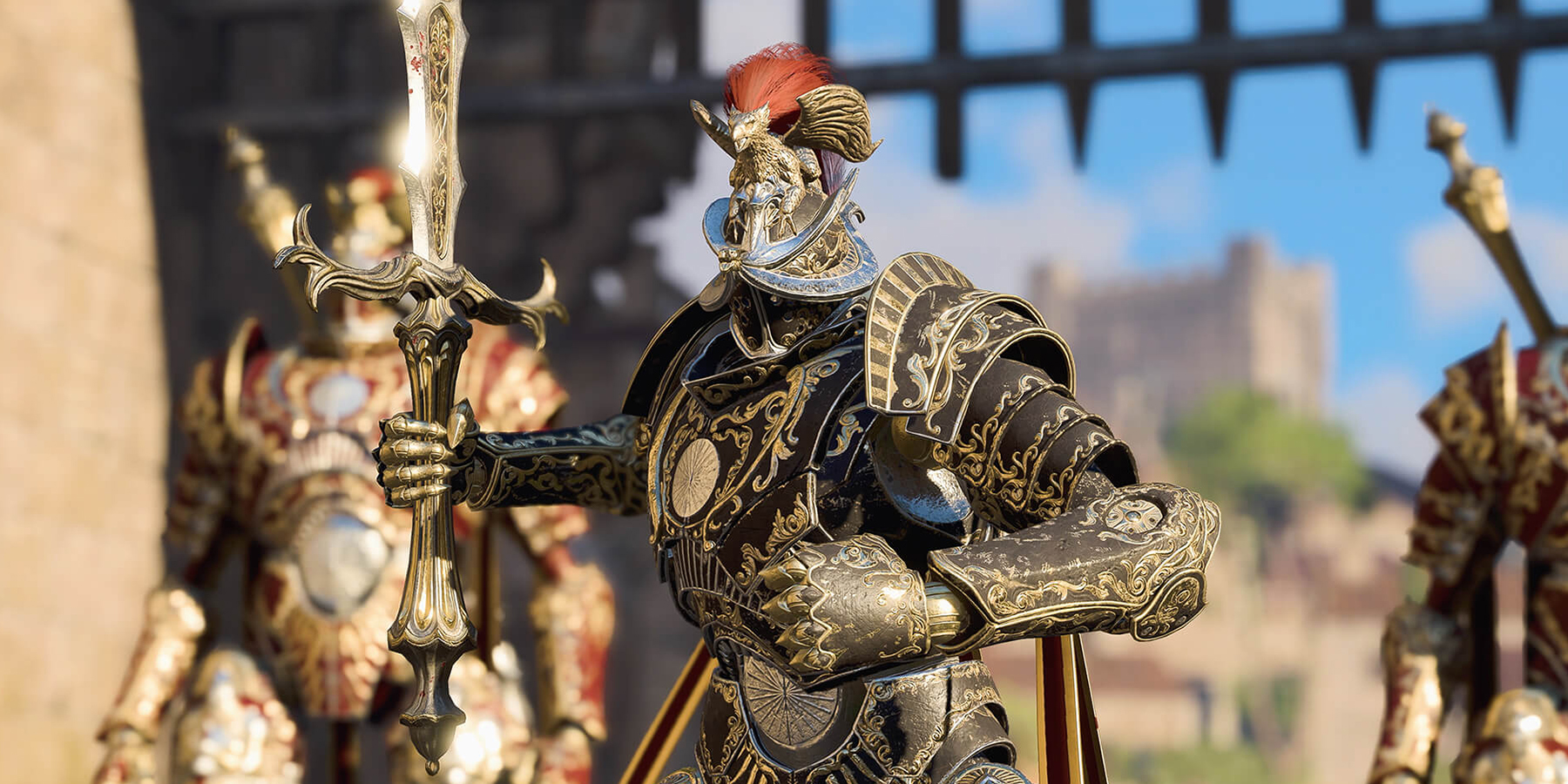"Fueled by the Oath you swore to uphold justice and righteousness, you are a beacon of hope in dark times."
Need to know more about the Paladin class? Then you've come to the right place!
*Not all information was available in Early Access - we will update as soon as we can!*
Table of Contents
Roleplaying as a Paladin
With a shove, you knock the man to his knees. He seems on the verge of tears. "It was just a job, I swears! We didn't mean nothin' by it!" He continues to blubber like a fool as you survey the room around you - the broken door, the broken bodies. The criminal continues. "My lady, please!" You scoff as you pull your blade from the chest of the previous brigand who tried this tactic, but remain silent. Here it comes. "...I beg you, mercy!" "Mercy," you finally exclaim, "No: I will give you what you deserve. Justice!!" before bringing the sword down upon his head.
If this sounds interesting to you, consider a Paladin. With a strong arm and a stronger will, this class treads the line between justice and retribution.
Class Features at 1st Level
- Starting Hit Points: 10 + your Constitution modifier
- Proficiencies:
- All armors, Shields, Simple and Martial weapons
- Wisdom and Charisma Saving Throws
- Two skills from the following list: Athletics, Insight, Intimidation, Medicine, Persuasion, and/or Religion
- Paladins choose the Oath they swear to uphold, determining their subclass.
- This comes with a Channel Oath charge, used to activate your Oath's special features. You gain more charges as you level in Paladin.
- Lay on Hands, which can be used to heal someone via touch or cure them of poison or disease.
- This ability requires charges, which increase in number as you level in Paladin.
- Divine Sense, granting Advantage on Attack rolls made against celestials, fiends, or the undead.
Class Features at Higher Levels
- Hit Points at Later Levels: 6 + your Constitution modifier
- At level 2, Paladins receive the ability to cast divine spells and a small number of spell slots.
- Additional spells and spell slots are earned as you level in Paladin.
- They use their Charisma modifier for this spellcasting capability.
- Paladins prepare their spells in advance. You can swap your current spell-list around outside of combat, but are limited in your choices once a battle begins.
- At level 2 Paladins gain Divine Smite, allowing you to spend a spell slot to inflict bonus Radiant damage on an enemy with your melee attack.
- The amount of bonus damage depends on the level of the spell slot used up by this ability.
- Also at level 2, Paladins choose a Fighting Style, denoting a specialty in a certain style of combat.
- Defense: +1 to your Armor Class while wearing armor.
- Dueling: +2 bonus damage when you only use one melee weapon (and your other hand is empty).
- Great Weapon Fighting: The ability to reroll a damage result of 1 or 2 with a two-handed melee weapon, once per attack.
- Protection: Use your shield to give an enemy Disadvantage on an Attack roll when they strike an ally within 1.5 meters of you.
- At level 3, Paladins gain an immunity to disease.
- At levels 4, 8 and 12, you can increase one of your Ability scores by 2, two Ability scores by 1, or choose a Feat, which can provide you bonuses to Ability scores and skills simultaneously.
- At level 5, Paladins gain an Extra Attack in combat.
- *Not revealed yet.*
Subclasses
Paladins follow a particular Oath, tenets of faith that they swear to abide by. Breaking your Oath is considered a serious offense, resulting in you losing your Paladin abilities until you atone for your transgression. There are three Oaths you can choose from: the Oath of Devotion, Oath of the Ancients, or Oath of Vengeance. There is also a secret fourth option, that of the Oathbreaker.
If you ever make a choice that results in you breaking your Oath, a symbol will appear in the lower-left corner of the character bar. You'll also be visited by the Oathbreaker Knight, who will none-too-subtly inform you of your misdeed. Your options at day's end are to pay the Knight gold as penance, or become an Oathbreaker Paladin.
- The Oath of Devotion upholds the truth of order, virtue, and justice.
- At level 1, you may use your Channel Oath charge to apply Holy Rebuke, allowing an ally to inflict Radiant damage to enemies who strike them with a melee attack.
- At level 3, you gain four new abilities/spells.
- Sacred Weapon, using a Channel Oath charge to fill your weapon with positive energy.
- Turn the Unholy, using a Channel Oath charge to turn away undead or fiends.
- The spells Sanctuary and Protection from Evil and Good
- At level 5, you gain two new spells: Lesser Restoration and Silence.
- *Not revealed yet.*
- The Oath of Ancients chooses to stand against darkness, committed to life and the light.
- At level 1, you may use your Channel Oath charge to perform Healing Radiance, which heals nearby allies now and again on your next turn.
- At level 3, you gain four new abilities/spells.
- Nature's Wrath, using a Channel Oath charge to restrain an enemy with vines.
- Turn the Faithless, using a Channel Oath charge to turn away enemy fey or fiends.
- The spells Speak with Animals and Ensnaring Strike (Ranged).
- At level 5, you gain two new spells: Misty Step and Moonbeam.
- *Not revealed yet.*
- The Oath of Vengeance punishes those who have performed evil acts, avenging the wronged.
- At level 1, you may use your Channel Oath charge to grant allied weapons additional Radiant damage and the chance to Daze.
- *Not revealed yet.*
- Oathbreakers are impenitent warriors of cruelty, having fallen from the light.
- *Not revealed yet.*
Preferred Ability Scores
Paladins would love to have all their stats maxed out, but alas they must focus on certain ones. Charisma affects their spellcasting ability and general capability to interact with people on their quest. After that, Strength and Constitution are important for frontline-warriors. Wisdom is nice for discerning the situation and reading people. Dexterity isn't as important given they wear heavy armor, and Intelligence can be ignored if needed.
Multiclassing Suggestions
Mixing Paladin with another class can be a challenge - the Oath of a Paladin can lead to some...roleplay rigidity, as it were. Not all players want to deal with something that restricts their choices and/or punishes them for choosing incorrectly. That being said, Paladin can be a source of immense power in the right hands.
Paladin & Sorcerer
Is a common grouping that is quite strong. Sorcerers use their Charisma for spellcasting too, and provide a plethora of spell slots which one can trade in for Divine Smite usage. Metamagic is always a plus, as well. To the Sorcerer, the access to armor and melee combat can be appreciated.
Paladin & Warlock
Seems crazy at first glance, but they both use Charisma for spellcasting, and Pact of the Blade combined with the Paladin's Divine Smite can be quite powerful. A Paladin wants more spell slots to turn into extra Smites, of which the Warlock can provide. The Warlock then gains access to healing, heavier armor and more damaging melee weapons.
More Baldur's Gate 3 Class Guides
Considering a different class? Choose one of the options below!
Baldur's Gate 3 Character Creation Guides
When you're ready to continue, head to one of the other sections of this guide; Background would be next!






















Comments
No Comments Yet. Be the first to create one down below!